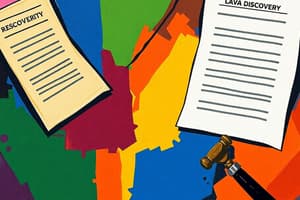Podcast
Questions and Answers
What types of materials must be discovered according to the notice to discover?
What types of materials must be discovered according to the notice to discover?
- Only tape recordings related to the trial
- Any documents and tape recordings in possession or control (correct)
- Documents that are beneficial to a party's argument
- Only documents that directly support a party's case
What does indirect relevance of a document mean in the context of discovery?
What does indirect relevance of a document mean in the context of discovery?
- The document must support the opposing party's argument
- The document is irrelevant and does not need to be disclosed
- The document is only relevant if it damages a party's case
- The document contains information that could lead to further inquiry (correct)
Which of the following is NOT required to be discovered?
Which of the following is NOT required to be discovered?
- Documents that have been previously in possession
- Documents that are confidential or privileged (correct)
- Evidence that relates to any matter in question
- Tape recordings currently held by a party
What is the primary purpose of discovery in litigation?
What is the primary purpose of discovery in litigation?
Which of the following statements about tape recordings is true?
Which of the following statements about tape recordings is true?
How should a party handle documents that they believe are harmful to their case during discovery?
How should a party handle documents that they believe are harmful to their case during discovery?
What does the term 'disclosure' specifically refer to in this context?
What does the term 'disclosure' specifically refer to in this context?
Which of the following describes what can be included in tape recordings?
Which of the following describes what can be included in tape recordings?
What is one type of document that cannot be attached to a discovery affidavit according to the relevant court rules?
What is one type of document that cannot be attached to a discovery affidavit according to the relevant court rules?
Which statement accurately describes the first schedule of the discovery affidavit?
Which statement accurately describes the first schedule of the discovery affidavit?
What does 'legal professional privilege' entail in the context of a discovery affidavit?
What does 'legal professional privilege' entail in the context of a discovery affidavit?
What is required for documents listed on the discovery affidavit to be deemed privileged?
What is required for documents listed on the discovery affidavit to be deemed privileged?
Which of the following best describes the second schedule of the discovery affidavit?
Which of the following best describes the second schedule of the discovery affidavit?
Which type of privilege protects written communications between spouses?
Which type of privilege protects written communications between spouses?
What is a key requirement for how documents should be presented in a discovery affidavit?
What is a key requirement for how documents should be presented in a discovery affidavit?
Which of the following is not included in the documents that must be attached to a discovery affidavit?
Which of the following is not included in the documents that must be attached to a discovery affidavit?
What must parties deliver not less than 10 court days before the conference?
What must parties deliver not less than 10 court days before the conference?
Which of the following should be included in the rule 37 minute after the conference?
Which of the following should be included in the rule 37 minute after the conference?
What should be recorded if a party feels prejudiced due to noncompliance with court rules?
What should be recorded if a party feels prejudiced due to noncompliance with court rules?
What action must every party claiming relief take regarding settlement proposals?
What action must every party claiming relief take regarding settlement proposals?
In the context of the conference, what does rule 33(4) address?
In the context of the conference, what does rule 33(4) address?
Which of the following is necessary regarding the production of proof by affidavit?
Which of the following is necessary regarding the production of proof by affidavit?
What determines whether a case should be transferred to another court?
What determines whether a case should be transferred to another court?
Which party is responsible for the copying and preparation of documents according to the rule 37 minute?
Which party is responsible for the copying and preparation of documents according to the rule 37 minute?
Flashcards are hidden until you start studying
Study Notes
Discovery Process
- A notice to discover requests the opposing party to provide all relevant documents and recordings related to the case.
- Discovery includes documents and tape recordings currently in possession or control or those held in the past.
Types of Evidence
- Tape recordings encompass various formats, including soundtracks, films, magnetic tapes, disks, and hard drives.
- Documents relevant to the case must be disclosed, regardless of whether they support or hinder a party's position.
Purpose of Discovery
- Aimed at establishing transparency and preventing prolonged litigation over irrelevant matters.
- Relevant documents are those that could advance a party's case or damage the opponent's case, including information that leads to further inquiries.
Privileged Documents
- Opposing parties cannot inspect privileged documents, which include:
- Witness statements prepared for the case
- Communications between attorney and client
- Pleadings and notices in the action
Discovery Affidavit
- The discovery affidavit should follow specific forms: Magistrate’s Court Form 13 and High Court Form 11.
- Organized into two schedules:
First Schedule
- Contains documents and recordings currently possessed by the deposing party.
- Divided into two parts:
- Documents without objection for inspection.
- Documents objectionable due to privilege, including:
- Self-incrimination privilege
- Marital privilege
- Without-prejudice settlement offers
- Legal professional privilege
Second Schedule
- Lists documents and recordings that were previously possessed but are no longer available, such as sent correspondence.
Document Listing
- Documents must be listed chronologically, individually, and numbered or labeled as a ‘bundle of documents’.
Conference Procedure
- Parties must deliver the agenda for the conference at least 10 court days prior, summarizing admissions, inquiries, and relevant matters.
- The conference is private, involving only advocates and attorneys.
- A record (Rule 37 minute) must be prepared immediately after the conference, signed by all present.
Record Contents
- Includes date, location, attendees, and any noncompliance issues.
- Notes settlement proposals made and responses from opposing parties.
- Documents agreements regarding mediation, arbitration, or case transfer.
- Records admissions by each party and any disputes on burden of proof.
- Details responsibilities for document preparation and agreements on document proof requirements.
Studying That Suits You
Use AI to generate personalized quizzes and flashcards to suit your learning preferences.




